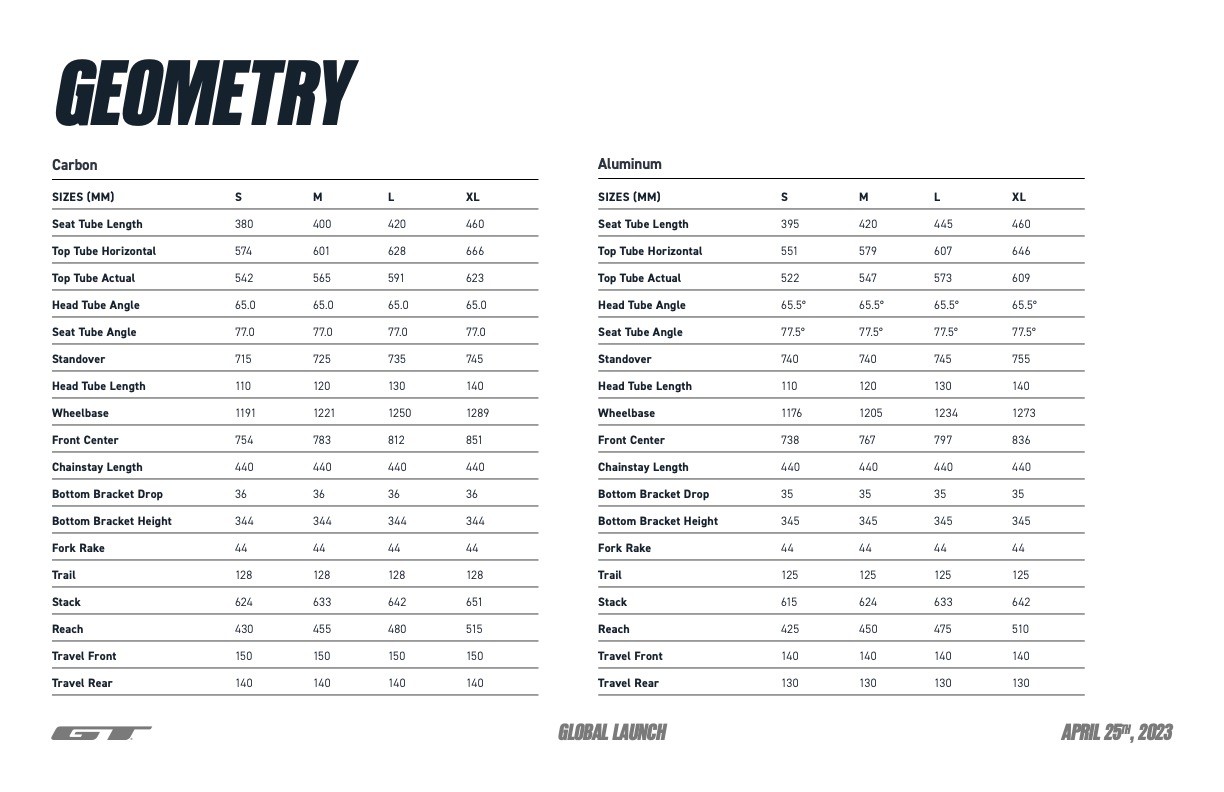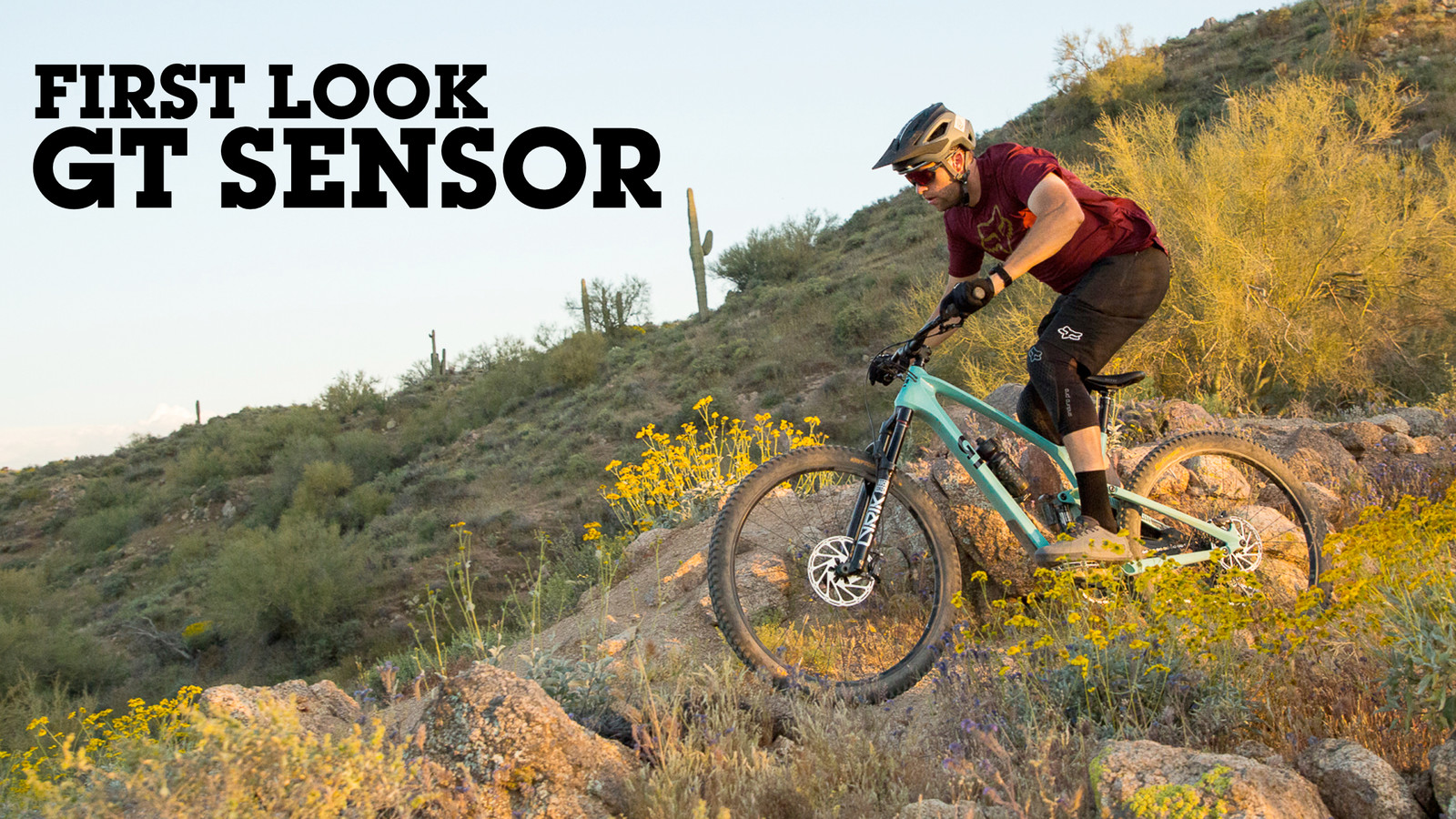GT has focused on opening up the capability of their popular Sensor trail bike. Now more than capable of all-day rides the bike retains confidence to tackle any trail feature as the updates nudge it further toward the aggressive end of the category. A new ground-up chassis for the Sensor pairs an increase in suspension travel with moderate geometry changes to create a balance between stability and liveliness. The new frame sees a 600-gram weight reduction compared to its predecessor and now uses a carbon seat stay. Cable routing is simplified using tubes within the frame, keeping rattling to a minimum. Small through XL frame sizes remain, but numbers have grown to fit the full spectrum of riders.

Highlights
- Travel: 140mm rear / 150mm front (Tested)
- Fully routed internal cables
- Boost 148x12mm rear hub spacing
- Tapered headtube
- 31.6mm seat tube diameter
- Sizes: S-XL
- 29" Wheels
- Carbon and aluminum frame options
- Molded downtube frame protection
- Sensor ST (120mm rear / 130mm front) also available
- MSRP: $5,750 USD

Build Kit
Our Sensor Carbon LE is the top-of-the-line offering available from GT at $5,750 and comes spec'd as such. Suspension components are strong points of the build kit, with a 150mm-travel Rock Shox Lyrik Ultimate fork and a trunnion-mounted 185x55mm Super Deluxe Ultimate shock that provides 140mm of rear wheel travel. The brakes are SRAM Code RSC paired with 180mm rear and 200mm front rotors. SRAM also handles the drivetrain, with cable-actuated Eagle X0 12-speed shifter and derailleur paired to a GX cassette and Truvativ Descendant cranks. While the Continental Kryptotal tires were another standout component of the build kit, the WTB KOM i30 wheels they came wrapped around were undoubtedly the weak point of the bike. Our first ride resulted in a very wobbly rear wheel from a rapid loss in spoke tension.




Four other complete build options exist in addition to a frame-only option at $3,500. The Sensor Carbon Pro uses Rock Shot Select+ level suspension and SRAM GX drivetrain priced at $4,950. A Marzocchi coil shock and Bomber Z1 fork are paired with SRAM SX drivetrain on the Carbon Elite build kit for $3,800. In addition to the carbon frame models, two aluminum build kits for the Sensor are available in the form of the Sport and Comp level bikes for $2,600 and $2,300 respectively.






On the Trail
Like most trail bikes in the mid-travel category, it's more about one aspect of the ride quality than a consistent feeling across any terrain. The Sensor had a nimble feeling that was very responsive to input from the rider in most situations. Generating speed was easy; the Sensor accelerated quickly, whether in the saddle, catching backsides along flatter sections of trail, or through the apex of turns.

Maintaining or creating momentum without throwing in extra pedals made for a rewarding ride experience and was especially fun on trails loaded with features. Riding rougher terrain did result in a slightly less settled feeling at the rear wheel but resulted in a more composed ride through bigger compressions. Pointed uphill, The Sensor rewarded a higher pedaling cadence, and at a lower tempo, things felt slightly less balanced and a bit twitchy at times. Overall, riding with precision was the most rewarding part of our time aboard the Sensor.
As noted above, the wheel spec is somewhat puzzling. The WTB KOM i30 wheels use a three-pawl hub and the spoke tension was compromised on our first ride. Subsequent rides continued to challenge the wheels, and we constantly checked the spokes.

Geometry
The numbers of the new Sensor place it comfortably in the aggressive trail category. While it may not be extreme at one end or the other, the bike will allow most riders to get as aggressive as they'd like. What we first noticed about the relatively moderate geometry of the bike was the efficient pedaling position it creates. Being upright in the saddle allowed for a high cadence with minimal effort, increasing our overall trail speed on our everyday loops. The roomy front end placed us comfortably behind the front wheel, providing plenty of space while sprinting and inspiring confidence while descending.


A reasonably short rear-center measurement for our size XL test bike contributed to the light front end while climbing, making lower cadence moves slightly more tricky. Pointed downhill, this short rear end makes for an easy-to-flick rear wheel that maximizes the fun factor. There are no flip chips on the Sensor for geometry or suspension to keep things simple and familiar for riders.

What's The Bottom Line?
The Sensor provides an excellent platform for the everyday trail bike. We enjoyed riding aggressive terrain but found even more enjoyment from the less extreme, more familiar daily rides most riders find themselves on. Robust frame construction and lateral rigidity contribute to a responsive ride that rewards rider input. In addition to the solid foundation GT has created, the build kit makes for a comfortable ride that is easy to set up and adjust as needed. As for things we would change, the wheels are likely a necessary upgrade for most riders considering the Sensor as a daily driver. Overall, the GT Sensor is an excellent choice for riders who enjoy a creative approach to descents and ride with a lot of input on the bike.
For more information on the Sensor, please visit gtbicycles.com
Photos By: Jeremy Ray
About The Tester
Jonathon Simonetti - Age: 27 // Years Riding MTB: 18 // Height: 6’4” (1.93m) // Weight: 215-pounds (97.5kg)
Jonny started mountain biking in 2003 after a trip to Northstar showed him how much more could be ridden on 26” wheels than on a BMX bike. He began racing downhill in 2004 and raced for 12 years until ultimately deciding having fun on a bike was more important than race results. After working as a mechanic in the industry for a few years and developing a deeper understanding of bikes inside and out, he has an aptitude for pairing his riding ability with the analysis of bikes and breaking down what makes them work well. He spends most of his time between trail rides and skatepark sessions, with occasional days on the downhill bike.







View replies to: First Look: GT Sensor Carbon Pro LE
Comments